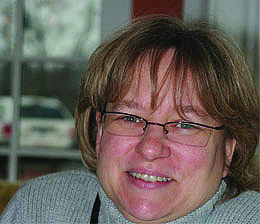

Cindi Raebel is the stage manager for Barter's production of Les Misérables.
Putting together any theatrical production requires keeping track of myriad details. We often wonder how an actor remembers his lines and how he's supposed to move; how he keeps track of costumes and props; and how lighting and sound people remember what they're supposed to do. The answer is the stage manager.
When it comes to Les Misérables, that stage manager is Cindi Raebel. In her eighth season with Barter Theatre, she says the short version of her job is to make sure all the puzzle pieces are put together properly.
This puzzle is huge. She keeps track of every movement that every actor makes – and there are 26 actors in Les Mis – and every technical detail.
"I'm there during rehearsal taking down any staging or blocking, when someone moves to stage left or stage right, or they sit, stand or kick their leg, I write down all of that, so that when we do it again, if the actor isn't quite sure or the director doesn't remember when it happens, I can say this is what we did last time," Raebel says. "I'm also the liaison between the director and all the designers, so if the director decides he wants a blue couch instead of a green couch, I have to make sure the set designer knows he wants the different color couch. I get all the light cues, all the follow-spot cues (a light that follows an actor around the stage, four of them in Les Mis). I'll tell the person who's bringing the head downstage when to go. I tell the light board operator when to follow a cue. If there's a sound cue that isn't orchestra or music related, I tell them when to go. No one does anything technical unless they hear the word from me."
She also keeps track of how the costumes change throughout the performance and where the actor will be so that the costumers will be in the right place with the right costume piece. "I make a list that lets them know that Valjean will exit stage left and needs his army jacket. I do that for every costume change."
Whenever a piece of the set moves – in the case of Les Mis the pieces are the large head, moveable walls, two trapdoors and someone who flies in – she tracks that.
"It's a light-heavy show, but it doesn't have too many scene shifts. The actors do most of the movement. I just need to make sure I know their movements well enough so that if an understudy has to go on I can plug that person in and plug in that hole."
Once the show opens, she also keeps an eye on the actors to make sure that they don't stray away from what the director or choreographer wants them to do. "I let them know that they're getting too big or going too far or crossing too far stage right so they're not in their light anymore. I maintain it. Rick and Amanda will stop in periodically to watch and give notes, but for the most part it's me every night."
If all of that isn't quite enough for one person to do, she also acts as a mediator. "If somebody has a problem, they'll come to me; and I'll help them solve it. I and my staff mediate if there's a personal problem. I'm like the mom or the lifeguard. I help push rehearsals forward; so the director can have fun and laugh, but when it's time to move forward I have the power and responsibility to get us back on track."
She keeps track of all of this on a prompt script: blocking, costumes and props are on the left side of the book; dialogue and anything she has to say out loud are on the right side.
If it sounds impossible, she says it's common sense, focus, good listening skills, a great staff to back her up and organization. It is a job that she loves. "Anytime I talk to people about my job, they can tell I love it because I start talking faster and using hand gestures," she says.
"A good stage manager won't have a big ego," she says. "Actors have to have egos because they get rejected on a daily basis. The director and designers have to have egos. You have to have one person who doesn't, who can keep everything together.
"The stage manager is the glue that makes it stick and makes it work. Hopefully, I make it all run smoothly and everyone else gets the credit, which is how it should be. The best compliment for a stage manager is no compliment because that means you're solving all the problems before they become problems. So everything is going smoothly."
So when you watch Les Miserables, and it all works, remember that Raebel is back stage calling every detail. She won't get a curtain call. Maybe you could pay her a compliment, but she won't expect one.
BACK TO THE MAIN STORY:
-- Barter Theatre's Les Misérables is unique storytelling